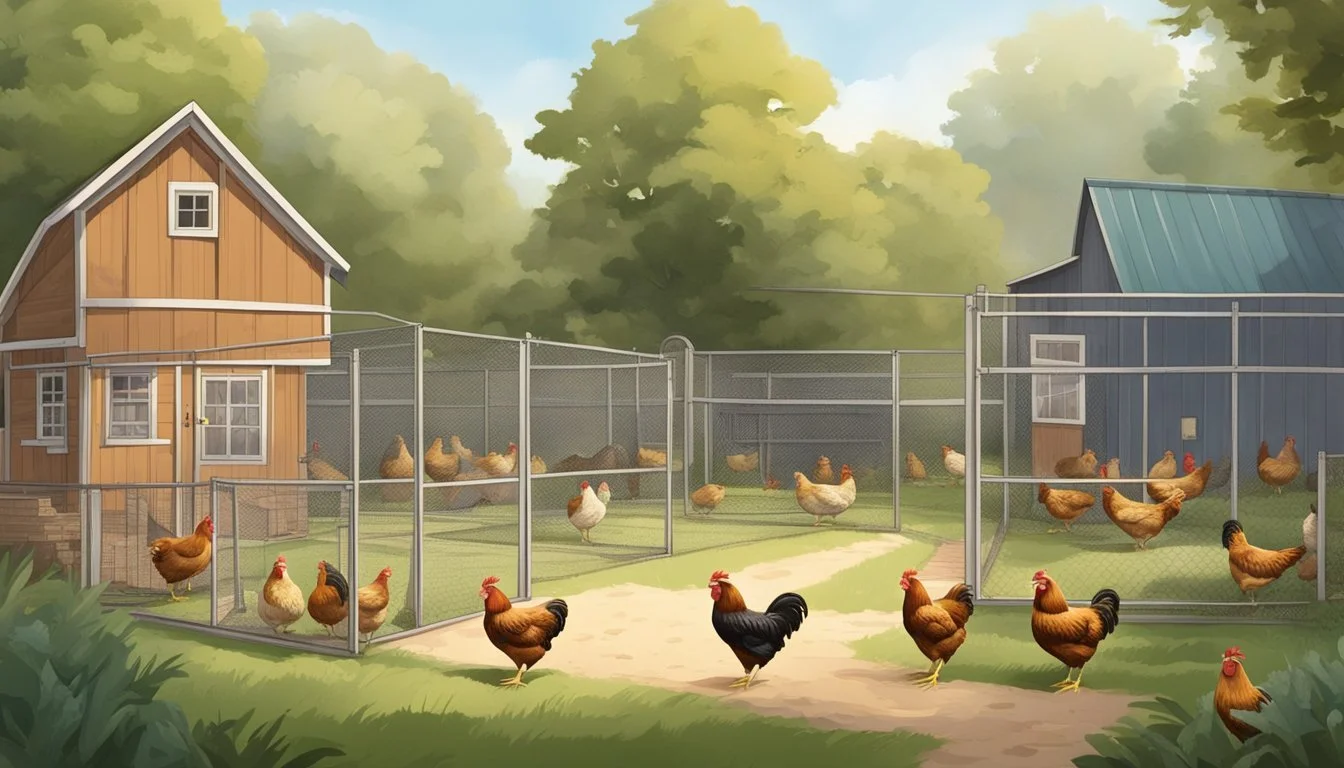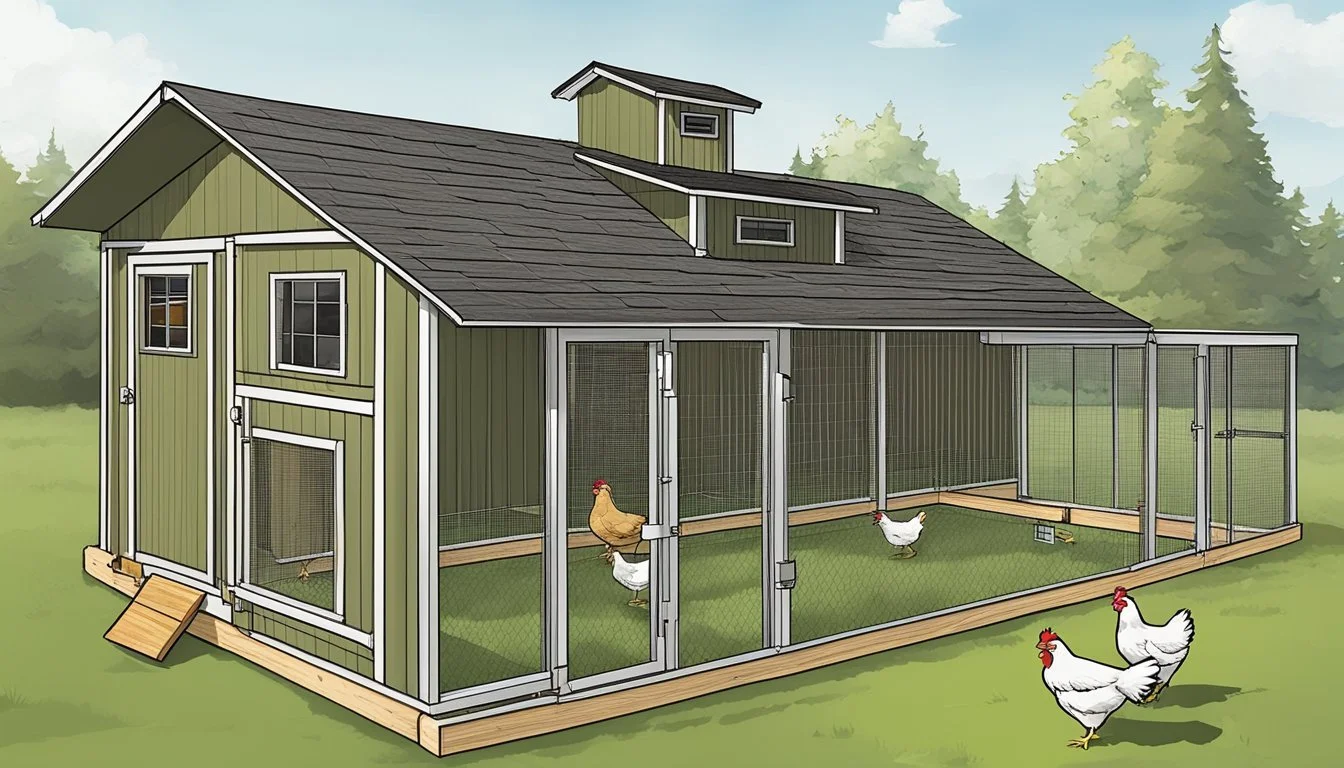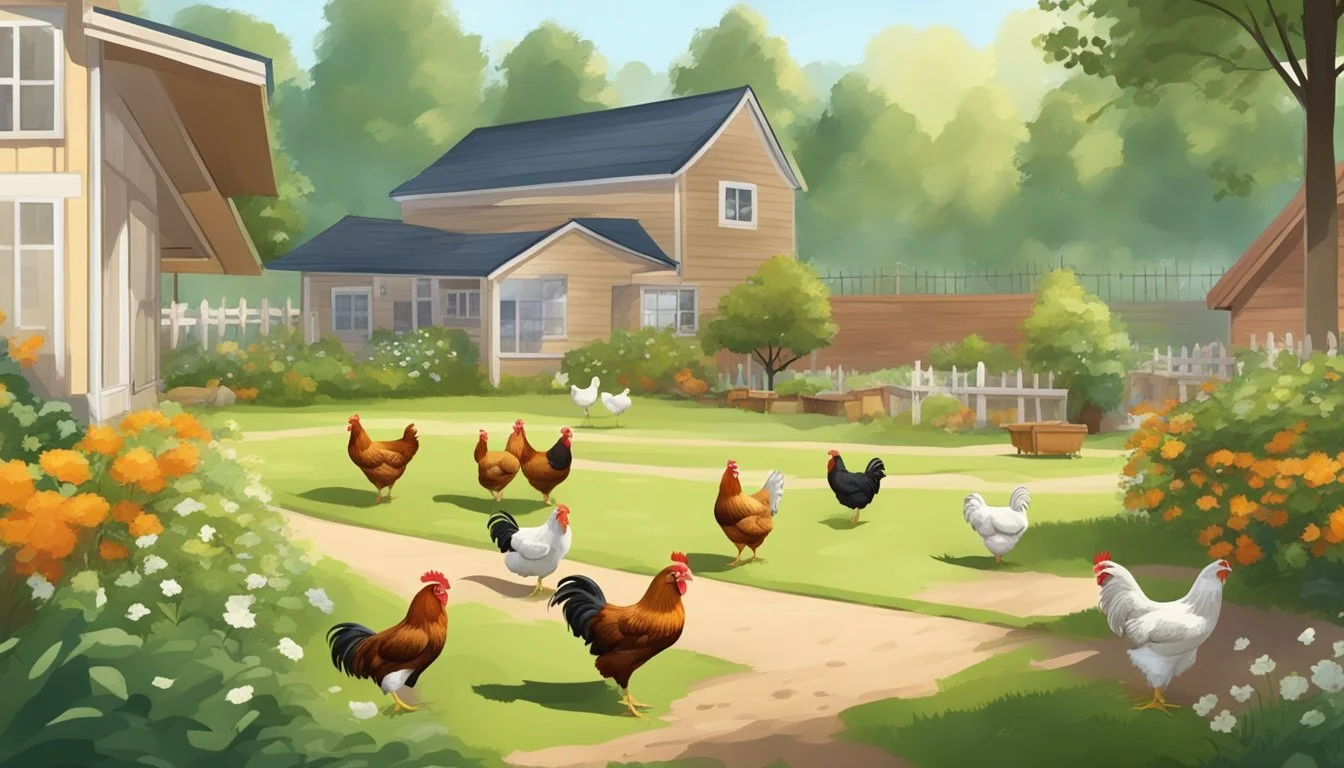Keeping Backyard Chickens in Spokane Valley, WA
Essential Guidelines for Beginners
Backyard chickens (how long does chicken last?) are a popular pursuit for Spokane Valley residents looking to embrace a more sustainable lifestyle by producing their own fresh eggs and promoting natural pest control. In Spokane Valley, the city ordinances are amenable to this practice, allowing individuals to keep chickens in accordance with local regulations. Interested residents can own a chicken for every 1,000 square feet of their property, but must adhere to specific requirements to ensure the health and safety of the chickens, as well as maintaining the serenity of the neighborhood.
Spokane Valley's specific rules signify a commitment to balancing urban life with the benefits of small-scale agriculture. The regulations stipulate that chicken coops are subject to setback requirements to minimize any potential nuisances, such as noise or odor, for neighboring properties. This reflects a broader trend in Washington State, where many cities have opened the door to backyard poultry keeping within urban and suburban settings, under certain conditions.
While the trend gains momentum, prospective poultry keepers in Spokane Valley must remain aware of the specific details covered by the municipal code, like the prohibition of roosters and the mandated distances that chicken pens must be kept from dwelling on adjacent properties. These details are pivotal for both harmony amongst neighbors and the well-being of the chickens themselves. In this way, Spokane Valley supports residents in their endeavors to participate in urban agriculture, while also setting clear guidelines to ensure that these practices integrate smoothly into the fabric of residential life.
Understanding Local Chicken Laws
When considering the keeping of backyard chickens within Spokane Valley, it is essential to be well-informed about the specific local and state regulations to ensure compliance and avoid any legal issues.
Spokane Valley Regulations
In Spokane Valley, homeowners are allowed to keep chickens, subject to specific property size requirements. The local ordinance permits one chicken per 1,000 square feet of property. For example, to have ten chickens, one would need a lot size of at least 10,000 square feet. It is important to note that roosters are not permitted within the urban zones of Spokane County. Chicken enclosures must adhere to setback requirements; they must be at least five feet from property lines and 25 feet from neighboring dwellings. Additionally, all pens, yards, and grazing areas are required to be maintained in a clean and sanitary state, as enforced by the Spokane County Regional Health District.
Washington State Requirements
Washington State laws generally allow the keeping of chickens in residentially zoned areas. However, the exact number of chickens allowed, the size of coops, and their placement on one's property may vary based on local zoning regulations. Owners should consult with state zoning regulations to ensure that their chicken-keeping practices are in full compliance with any broader state-level requirements beyond those imposed specifically by Spokane Valley.
Consequences of Non-Compliance
Non-compliance with Spokane Valley's chicken laws, or with broader Washington State regulations, can lead to various penalties. Potential consequences often include fines or the requirement to remove excess chickens or improperly situated coops. Persistent non-compliance may lead to more severe legal actions. Thus, it is imperative for residents to understand and adhere to the established guidelines to avoid any negative ramifications.
Choosing the Right Chicken Breed
When selecting chicken breeds for Spokane Valley, residents should consider the local climate, available space, and whether the primary purpose is for egg production, meat, or companionship.
Types of Chickens Suitable for Spokane Valley
Climate Adaptability: In Spokane Valley, where the climate includes cold winters and moderate summers, breeds like the Rhode Island Red are hardy and can tolerate the changing weather. These birds are also consistent layers of large brown eggs, making them a practical choice for egg production.
Space Efficiency: Residents with limited space should consider smaller breeds like Bantams which are well-suited for more compact residential lots. Each bird requires less room, which is beneficial in suburban areas where large lots may not be available.
Egg Production: For families interested in keeping chickens for eggs, choosing a breed like the Leghorn can be advantageous, as they are prolific layers known for their high egg yield.
Considerations for Raising Roosters
Noise Levels: Raising roosters in Spokane Valley may not be advisable due to noise concerns. Suburban residents in particular should be aware that roosters are not permitted in certain urban zones, as their crowing can cause disturbances.
Space Requirements: Roosters generally require more space than hens, as they can be territorial. It's important for a potential chicken keeper to ensure they have adequate space to avoid conflicts within the flock.
By carefully assessing these factors, Spokane Valley residents can choose the right chicken breed for their specific needs and housing situations.
Setting Up Your Chicken Coop and Run
A well-designed chicken coop and run are vital for the health, safety, and well-being of backyard chickens in Spokane Valley, WA. The coop provides shelter while the run offers safe outdoor access.
Essential Features of a Chicken Coop
A chicken coop must balance functionality with the requirements set forth by local ordinances. For Spokane Valley residents, the coop should adhere to the following specifics:
Size: The coop must be spacious enough to allow for at least 1 chicken per 1,000 square feet of property.
Security: Enclosures should be predator-proof with sturdy locks and reinforced mesh.
Ventilation: Proper ventilation is crucial to prevent moisture build-up and maintain air quality.
Insulation: To protect from Spokane's varying climate, sufficient insulation is necessary.
Ease of Cleaning: Coops should have a design that allows for regular cleaning with minimal effort.
Setbacks: Regulations require that coops be at least five feet from property lines and 25 feet from neighboring dwellings.
Designing a Secure and Spacious Run
The run is an outdoor enclosure that allows chickens to safely enjoy the outdoors. When designing a run, residents must consider:
Space: Each bird should have enough room to move freely. The more space, the happier and healthier the chickens will be.
Protection: The run should be enclosed with a roof or netting to protect chickens from predators and prevent escape.
Location: Position the run on a part of the property that complies with setback regulations and receives adequate sunlight.
Durability: Construct the run with materials that withstand Spokane Valley's weather conditions throughout the year.
Access: Include a door or gate for human access for maintenance and interaction with the flock.
Daily and Routine Care
Proper daily and routine care is essential for the health and productivity of backyard chickens in Spokane Valley, WA. Adherence to a consistent schedule ensures a clean and sanitary environment that promotes healthy birds and the production of fresh eggs.
Feeding and Watering
Chickens require a consistent supply of water and a balanced diet. Owners should provide:
Water: Fresh, clean water available at all times. Water containers must be cleaned daily to prevent algae and the spread of disease.
Feed: A quality commercial poultry feed tailored to the chicken's life stage (e.g., chick starter, layer pellets).
Cleaning and Maintenance
Regular cleaning is critical to maintaining a sanitary environment for chickens:
Daily: Remove and replace soiled bedding and clean any droppings.
Weekly: Conduct a thorough cleaning of coops, nests, and perches.
Monthly: Inspect for signs of wear or damage, ensuring the coop is secure against predators.
Health Monitoring and Disease Prevention
Vigilance in health monitoring ensures early detection of potential issues:
Daily Observation: Check for signs of distress, injury, or illness.
Disease Prevention: Clean shoes and tools to minimize disease transfer. Handle dead birds properly and consult a vet if there's an increase in mortality.
By adhering to these daily and routine care practices, chicken keepers can expect a thriving flock and a steady supply of fresh eggs.
Navigating Neighborhood Relations
When keeping backyard chickens in Spokane Valley, WA, maintaining a good relationship with neighbors is crucial. Addressing noise, odors, and space considerations proactively can prevent conflicts and ensure a harmonious community.
Managing Noise and Odors
Chickens can produce noise and odors that may affect neighboring properties. To manage these issues:
Noise: Roosters are known for their crowing, which can be loud and disruptive. Spokane Valley regulations allow hens but not roosters, which helps to minimize noise. Encourage chickens to be quiet by maintaining a consistent routine for feeding and care.
Odors: Regular cleaning of chicken coops and proper disposal of waste are essential to control odors. Implement a waste management system that includes frequent coop cleaning and consider composting the manure as a garden fertilizer to minimize the smell.
Property Line and Space Considerations
Property lines and available lot area can influence where one can place chicken coops. It's important to:
Lot Area: Spokane Valley code stipulates that chickens may be kept on residential parcels. However, the specific lot size impact on chicken-keeping has been previously reviewed, indicating that even smaller lots might have permissive regulations.
Property Lines: Respect property boundaries by situating chicken coops and runs at a considerate distance from neighboring dwellings, adhering to any local zoning regulations regarding the minimum setback requirements.
Communicating with Neighbors
Clear communication with neighbors can prevent misunderstandings and build a supportive community around urban chicken-keeping:
Initiate Dialogue: Share plans with neighbors about keeping chickens and discuss any concerns they may have. Provide assurance regarding the management of potential noise and odors.
Provide Information: Educate neighbors about the benefits of backyard chickens, such as pest control and egg production. Knowledge can help to alleviate any worries about the presence of chickens on adjacent lots.
Collaboration: Encourage community involvement, perhaps by sharing eggs or involving neighbors in chicken-related activities, fostering a sense of joint stewardship over urban farming practices.
Legal Considerations and Limitations
When considering the keeping of backyard chickens in Spokane Valley, WA, residents must adhere to specific municipal regulations to remain compliant. These ordinances dictate the number of chickens allowed and the restrictions on chicken coops and yards.
Number of Chickens Allowed
Residents of Spokane Valley are permitted to keep chickens on their property, with the number capped relative to the size of their lot. The allowed ratio is as follows:
One chicken per 1,000 square feet of lot area.
This limitation ensures that the density of chicken population is kept in check to mitigate potential issues related to noise, odor, or health.
Restrictions on Coops and Yards
In addition to the limitations on the number of chickens, Spokane Valley imposes specific requirements for the placement and construction of chicken coops and yards:
Coops must be set back five feet from the property line.
A minimum distance of 25 feet is required between coops and neighboring dwellings.
These setback restrictions are designed to minimize disturbances to neighboring properties and promote a harmonious urban farming experience. Residents must plan their coop placement strategically within these confines to maximize their space while adhering to the legal boundaries.
Advantages of Raising Backyard Chickens
Raising chickens in the backyard offers Spokane Valley residents a way to contribute to sustainable living and provides a hands-on educational experience. The following subsections detail the specific benefits homeowners can expect.
Sustainability and Self-Sufficiency
Residents in Spokane Valley can enhance their household's sustainability by raising chickens. These birds contribute to a self-sufficient lifestyle by providing a steady supply of fresh eggs, eliminating the need for commercially bought eggs. Unlike store-bought eggs, those from backyard poultry often come from hens that are free-ranged or kept in improved living conditions, resulting in eggs that are fresh and potentially more nutritious. Chickens can also be an integral part of a home's food waste system, as they consume many kitchen scraps, reducing the amount of waste sent to landfills.
Educational Opportunities
Beyond the tangible yield of fresh eggs, raising chickens serves as an educational tool. For families with children, the daily responsibilities of caring for poultry provide practical lessons in responsibility, animal husbandry, and understanding the food supply chain. Adults and children alike learn about the lifecycle and behaviors of chickens, which can be particularly enlightening for those living in more urban areas where agriculture is less visible.
Understanding Zoning and Development Standards
In Spokane Valley, WA, the zoning codes specific to chicken keeping are integral for residents to understand in order to raise chickens legally within different residential zones.
Zoning for Chicken Keeping
Spokane County provides guidelines for raising chickens within various zoning categories. Urban and rural areas differ significantly in their provisions. In low-density residential zones, residents are permitted to raise chickens, which allows for suburban environments to partake in backyard chicken keeping. However, one crucial regulation is the standard of one hen per 1,000 square feet of lot size. This rule helps to maintain adequate space and living conditions for the chickens while also addressing concerns from adjacent properties regarding noise, sanitation, and space.
Rural areas and those on the outskirts of Spokane Valley tend to have more lenient restrictions, allowing larger numbers of animals due to the increased lot sizes typically found in these locations. The County Code specifies the necessary conditions under which large and small domesticated farm animals may be kept.
Future Amendments and Community Input
The Spokane County Commission periodically reviews and considers amendments to the county code that relate to domestic animal keeping. A proposed code amendment that garners community interest pertains to allowing the keeping and raising of chickens in specified zones to increase residents' ability to engage in this practice. The amendment's purpose is often to align with the growing interest of county residents to keep chickens for eggs, companionship, or as part of a sustainable lifestyle.
Community input is a critical aspect of these deliberations, as changes can impact many aspects of life in the county, from the suburban to rural spectrum. Residents are encouraged to participate in the process, providing feedback that could influence the final decision made by the County Commission regarding chicken keeping regulations.
Off-Limit Areas and Special Cases
Understanding where and under what conditions one can keep chickens in Spokane Valley is essential for compliance with local ordinances. This section delineates the prohibited areas for chicken keeping and specifies the special conditions applied to high-density residential zones.
Prohibited Areas for Chicken Keeping
In Spokane Valley, certain areas are designated off-limits for the keeping of chickens. These restrictions are in place to ensure the health and safety of both the animals and the community. Notably, roosters are entirely prohibited to mitigate noise concerns. Hutches and chicken pens must adhere to spatial regulations, whereby they are required to be set back a minimum of five feet from the rear property lines to respect neighbors' space and to maintain a clean environment.
Special Conditions in High-Density Residential Zones
High-density residential zones, typically characterized by multi-family dwellings and closer quarters, have specific guidelines for backyard chicken enthusiasts. Unlike low-density residential areas, where rules may be more relaxed due to the larger plot sizes, these zones necessitate stringent regulations. Residents in these areas who wish to keep chickens must ensure that their practices are in compliance with the set standards, which may permit chicken keeping but with a lower number of chickens or additional space requirements to minimize potential disruptions to the close-knit community.










